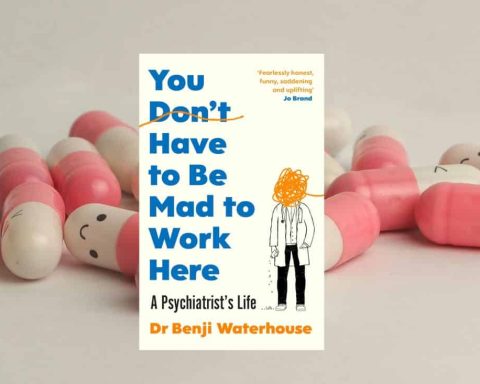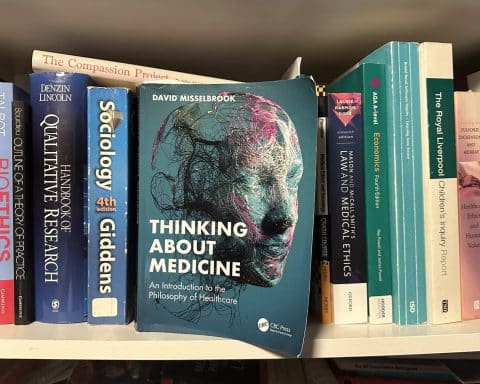
As a GP, do you consider yourself the living embodiment of practical virtue? Or just an ordinary doctor struggling to do a decent job for as many hours as the day provides? You could argue that there is really no great difference between the two.
It would take a philosopher to decide, and various philosophers have attempted this from time to time.1,2 Of those I know, Sylvie Delacroix is the subtlest and best informed. She has taken the trouble to study real GPs in work scenarios,3,4 even though her main area of expertise is in international data law. The question that most fascinates her is how responsible professionals practically enact their ethical principles in real life.
“… it is … a dance of the intellect … you need to read this book.”
Getting through the day while seeing patients every 10–15 minutes is what our job is about. We cope by developing habits, or else we could not cope at all. We face all sorts of distractions. But then so do musicians, lawyers, and every other kind of professional. Roger Kneebone draws parallels between the challenges of several professions in his book, Expert: Understanding the Path to Mastery.5 Each offers particular challenges to attention. By concentrating on one particular aspect of our task we diminish our attention to its other aspects, and we rely on habit — often referred to more glamorously as ‘clinical judgement’ or ‘experience’ — to guide us unconsciously in this process.
This process may be inevitable, but it is also dangerous. What if we grow too dependent on our habits, and too narrow in focusing our attention? That question mark is an essential part of Delacroix’s book title, Habitual Ethics? The author wants to challenge us, and she certainly succeeds.
I have rarely read a more challenging book. It is clearly written, in sentences which are never too long for what they have to say. On the other hand, each is so richly packed with things worth saying that you need to read most of them twice. The flow of thought is compelling, but it is also a dance of the intellect, where you need to stand back after each section to marvel at where it has taken you and is about to take you. So although this is quite a short book, it will take you a long time to read. Be warned.
Here is an example of what I mean, where the author sets out what she wants her book to do:
‘To this day, relatively few philosophers have paid particular attention to the factors that condition the continued adaptability of both individual and collective habits. At the defiant end of the philosophical tradition, habits are seen as threats because of their assumed rigidity. At the other end, those who emphasise the empowering aspect of habit often underestimate the extent to which habits do need to change, whether it is because they were bad habits in the first place or have become so through lack of adaptability. This book can be read as an endeavour to delineate the conditions under which habits remain plastic enough to be at the service (rather than hampering) our ethical life.’ (p.8)
When I first read, and then reread, these sentences I felt the earth move a little. ‘The continued adaptability of both individual and collective habits’ is a phrase I have never come across in the literature of medical education, and yet it sums up the deep assumption that underlies it. If we cannot change doctors’ habits, why even bother trying to educate them? Perhaps each of us flatters ourself that we can change our own habits, but have we ever put this to the test? The author promises that she will address this question in ways that philosophers have not so far managed. Bring it on.
I would worry if there are any medical educators reading this review who don’t immediately want to get this book. But perhaps you don’t feel the same if you see your main role as ‘just an ordinary jobbing GP’, to use the common term. Do you really feel the need for someone ‘to delineate the conditions under which habits remain plastic enough to be at the service (rather than hampering) [your] ethical life’? Actually, I very much hope you would, even though you might balk at talking about yourself in such terms. It is exactly because you go through the day doing the best job that you can that you demonstrate an ethical life. Whatever you choose to call it, it consists of a stream of decisions that are consequential for other people. This is why philosophers are fascinated by general medical practice as one of the richest ecosystems of ethical activity.
“… general medical practice [is] one of the richest ecosystems of ethical activity.”
Sylvie Delacroix’s book sets out the role of habit within this ecosystem, and similar ones. She uses a broad definition of habit that encompasses all kinds of acquired or automatic behaviour. I find this a little too broad in a biological sense, but I don’t want to argue the point. If you are looking at an anthill, or at the NHS, you will see all sorts of creatures standing around or scurrying in roles that serve the system. Ants will form bridges for other ants. They ‘sense’ to do this when the circumstances require. We don’t need to detain ourselves debating whether to call this habit or instinct. This applies especially when we talk about human professional interactions, which always involve some form of conscious processing as signals are exchanged. To learn about this processing and how it might play out in the ethical life of the individual professional and the group, you need to read this book. I am afraid that I can offer you no short cuts, not even a summary. Of course it is hard. Are you telling me your job is not hard?
In fact, many are currently arguing that general practice has become too hard for any human to do. The cognitive role of information handling is prodigious and ever-increasing. The transactional and mental virtuosity demanded in sharing decisions at 10-minute intervals is well-nigh impossible. The amount of distractive noise from extraneous prompts and unnecessary work has become deafening. Mindlines6 break up and attention dissolves: what we would like to do for people bears little relation to what we do, still less to what they would hope we might do. Not for nothing is this described as moral distress.
Should this book cheer us up or make us throw in the towel? Personally, I am always cheered up when I read anything as brilliant and penetrating as this, particularly on the things I care most about. And the towel is not for throwing. Someone will always have to care for the sick, and the best people will always be those who know what they are doing and who care about the effect of everything they do. I very much hope that the author of this book remains interested in general practice, particularly since she is also interested in generative artificial intelligence and in the guardianship of data. My hope is that when these are combined to best effect, medicine will be transformed, and an entire new world of ethical habits will be created. Most of all I hope that these will be better, and more adaptable, habits than the ones we have.
Featured book: Sylvie Delacroix, Habitual Ethics?, Bloomsbury, 2022, HB, 176pp, £76.50, 978-1509920419
References
1. Cassam Q. Professional virtues in modern medicine. 2019. https://www.medicalvirtues.co.uk/_files/ugd/b71fb2_650bb885351341feb06a9f991eb74801.pdf (accessed 31 Oct 2023).
2. Jameel S, Peterson A, Arthur J. Ethics and the good doctor: character in the professional domain. Oxon: Routledge, 2022.
3. Drewett O, Hann G, Gillies M, et al. A discussion of the use of virtual reality for training healthcare practitioners to recognize child protection issues. Front Public Health 2019; 7: 255.
4. Pan X, Slater M, Beacco A, et al. The responses of medical general practitioners to unreasonable patient demand for antibiotics — a study of medical ethics using immersive virtual reality. PLoS One 2016; 11(2): e0146837.
5. Kneebone R. Expert: understanding the path to mastery. London: Penguin, 2021.
6. Gabbay J, le May A. Knowledge transformation in health and social care: putting Mindlines to work. Oxon: Routledge, 2023.
Featured photo by Susan Q Yin on Unsplash.









Thanks so much for this Richard – a must read, but £85 on Amazon – the paperback will be out in February, so I shall have to keep my habits as they are until then I fear!
I can’t wait to work on exploring the potential of certain design choices when it comes generative AI tools to support general practice, buoyed up by Richard’s inspiring words and thoughts… David: there is an open access version available: https://www.bloomsburycollections.com/monograph?docid=b-9781509920440